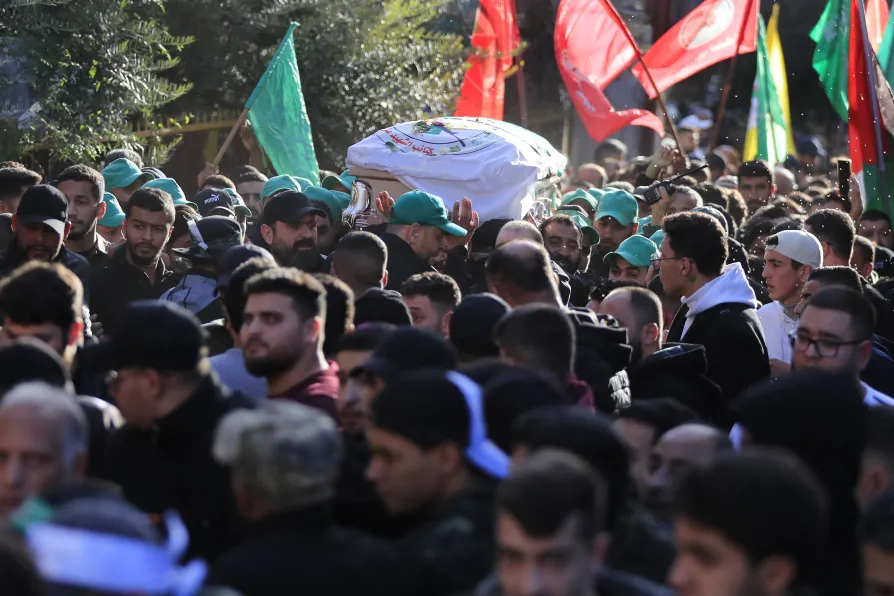
 Funeral procession of Ahmad Hammoud, South Lebanon, January 3, 2024
Funeral procession of Ahmad Hammoud, South Lebanon, January 3, 2024
ISRAEL’S assassination of a Hamas official in Beirut risks spreading the war on Gaza across the region.
On the face of it Israel has better justification for killing Saleh Arouri than for its actions in Gaza, where women and children make up two-thirds of its victims.
As a high-ranking Hamas official he could be considered an enemy. Given crocodile tears are all the US and British governments can spare for thousands of Palestinian civilians, why should they object to this?
But the reasons that we should reach to the heart of the conflict.
The most urgent is containment. The region is on a knife-edge: Houthi forces have clashed directly with the US Navy in the Red Sea. Iran, allied to the Houthis, has sent a warship to the area to square up to the US; it too was the site of a deadly terrorist attack yesterday, and while the perpetrators are unknown the strike on a commemorative service for Qassim Soleimani is bound to raise tensions with the US, which murdered him four years ago in an outrageous violation of international law.
Iran is allied to Hezbollah too. The most bloodthirsty neocons such as former US national security adviser John Bolton are calling for war with Iran: Washington may not want that, but Hezbollah and Israel are already exchanging fire and the latter’s disregard for borders when it decides to kill perceived enemies is a recipe for a wider war.
The assassination raises other questions. The US cannot take the moral high ground over extrajudicial killings on other countries’ territory, since Washington is the world leader in this field.
But Israel is a serial offender — even Britain expelled one of its diplomats in 2010 when an Israeli hit squad forged British passports for a murder in Dubai. The left should have no truck with the arrogation by powerful countries of the right to kill people around the world at a whim, and the lawlessness of the US and its allies in this regard should not be normalised.
Killing Arouri clearly falls under Israel’s declared war aim of destroying Hamas. Palestinians of all factions agree the war it is waging in Gaza is directed against their people as a whole, not Hamas: and Washington’s rebuke of Israeli ministers Itamar Ben-Gvir and Bezalel Smotrich for openly advocating the ethnic cleansing of Gaza shows they are right.
But even the official war aim should be challenged. Discussion of Gaza’s future takes no account of the wishes of the people of Gaza themselves.
The US wants the Palestinian Authority in charge; Benjamin Netanyahu says that’s out of the question; others talk of an imposed caretaker government. So far, only the peace conference proposed by China actually mentioned the Palestinian people’s agency in this question.
And that will be crucial. Hamas is, by many definitions, a terrorist group: it deliberately targets civilians. But then so does Israel, increasingly openly: and Hamas is also the group that has ruled Gaza since 2007, having won elections there in 2006.
Palestine’s failure to hold elections since then is a result of Israeli policy — explicitly acknowledged by Netanyahu — to keep Palestinians divided. And Hamas’s deadly raid on Israel, though the murder of civilians was unjustifiable, was a product of Israeli policy too, the brutal 17-year siege of the impoverished Gaza strip which was bound to instill hatred among its victims.
This is not a war which began on October 7. Nor is it a war rooted in Hamas’s ideology, however reactionary that is. It is a war occasioned by the denial of the Palestinian right to statehood by the Israeli occupation.
That is the issue which needs to be resolved through negotiations. And those negotiations will have to deal with the forces that exist, not those we would rather talk to. Murdering Hamas’s political leaders puts peace ever further out of reach.














